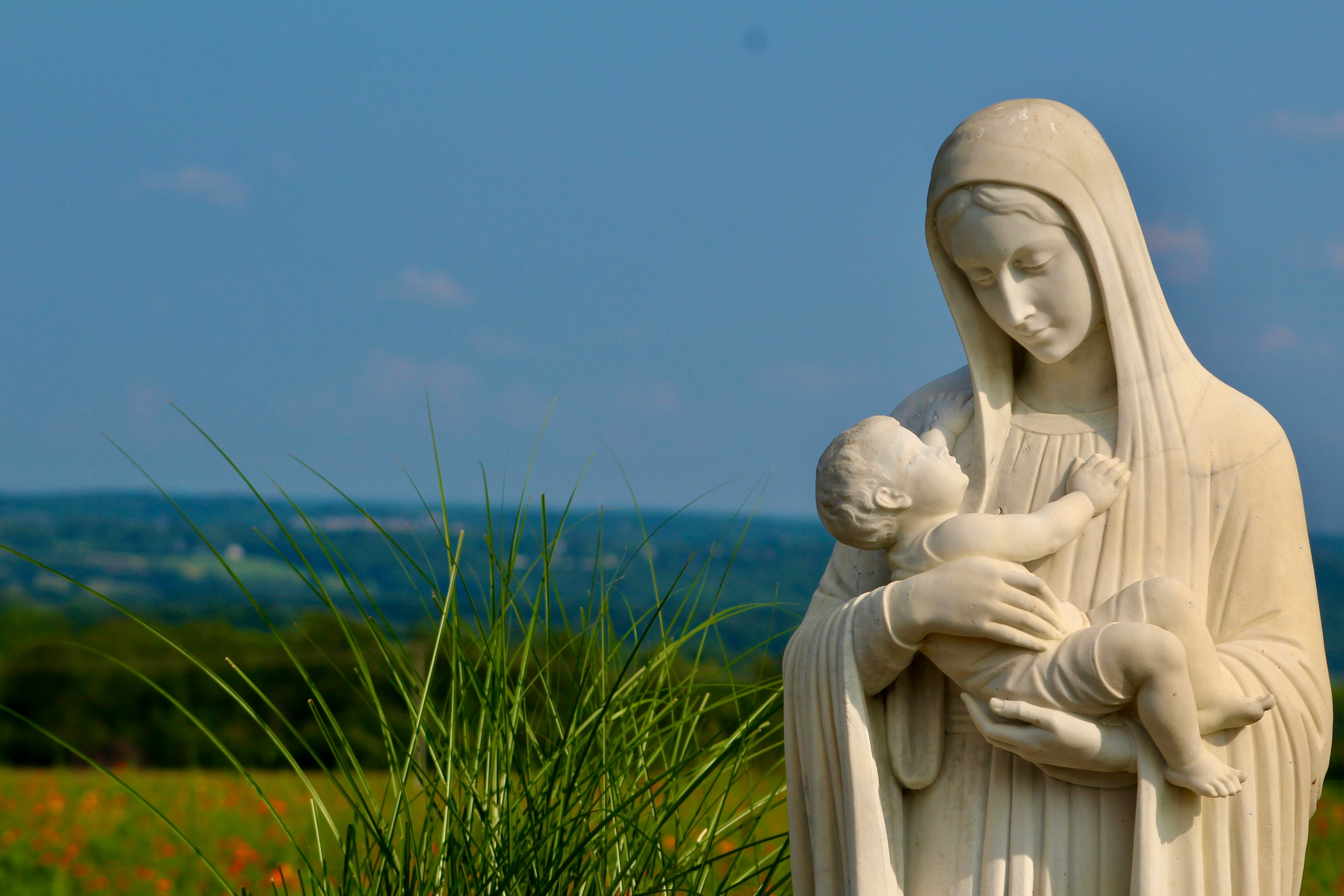Today’s Gospel is one used by most non-Catholics to prove that the Blessed Virgin Mary was not a virgin, let alone a perpetual virgin. I’m sure some of you have heard a different translation of the same Bible passage. In some cases the meaning becomes blurred. In this case, the word “brother” does not mean blood brothers. If that were true, we certainly would have known about them and their names.
In the original language the same word had different meanings. Throughout the years I have had a few friends who were so close they were like brothers. I even called them “brother”. I do not use that term lightly! Similarly, Jesus is saying here that his family is not limited to blood relatives. To believe in him is to belong to his family. Jesus said, “My mother and my brothers are those who hear the word of God and act on it.” That’s how much he loves us!
But what about the Blessed Mother? There are a select few saints who heard through personal revelation that Mary remained a virgin after Jesus’ birth. Although we are not bound to believe private revelation, the perpetual virginity of the Blessed Virgin Mary is a dogma in the Catholic and Orthodox churches, so we know it’s true! But how is that possible?
Just recently I heard an explanation that really made sense to me. Do you remember the time that Jesus appeared to the Apostles in the upper room after his resurrection even though all the doors were locked? They thought they were seeing a ghost. Try to imagine for a minute being in that room when He came in. He looked like Jesus, but how could that be possible? When something happens and there is no explanation, especially in the spiritual realm, we simply have to realize that God can do anything he wants. That means, anything!
The author of that commentary drew a parallel between Jesus’ birth and his appearance in the upper room. Jesus passed through everything to get there. And Jesus passed through Mary. This should give us something to ponder. He is very much above our understanding. God is awesome!
Serving with joy!
El Evangelio de hoy es uno que se utiliza la mayoría de los no católicos para demostrar que la Santísima Virgen María no era virgen, y mucho menos una virgen perpetua. Estoy seguro de que algunos de ustedes han escuchado una traducción diferente del mismo pasaje de la Biblia. En algunos casos el significado se vuelve confuso. En este caso, la palabra “hermano” no significa hermanos de sangre. Si eso fuera cierto, ciertamente habríamos sabido sobre ellos y sus nombres.
En el idioma original la misma palabra tenía diferentes significados. A lo largo de los años he tenido algunos amigos que eran tan cercanos que eran como hermanos. Incluso los llamé “hermano”. ¡Y no utilizo este término a la ligera! De forma semejante, Jesús está diciendo aquí que su familia no se limita a parientes consanguíneos. Creer en él es pertenecer a su familia. Jesús dijo: “Mi madre y mis hermanos son aquellos que escuchan la palabra de Dios y la ponen en práctica”. ¡Eso es lo mucho que nos ama!
Pero entonces ¿cómo queda la Madre de Jesús? Hay unos cuantos santos en particular que escucharon por revelación privada que María permaneció virgen después del nacimiento de Jesús. Aunque no estamos obligados a creer en la revelación privada, la virginidad perpetua de la Santísima Virgen María es un dogma en las iglesias católica y ortodoxa, ¡así que sabemos que es verdad! Pero, ¿cómo es posible?
Hace poco escuché una explicación que realmente tenía sentido para mí. ¿Te acuerdas de la vez que Jesús se apareció a los Apóstoles en el aposento alto después de su resurrección a pesar de que todas las puertas estaban cerradas con llave? Pensaron que estaban viendo un fantasma. Intenta imaginar por un minuto estar en esa habitación cuando Jesús entró. Ese hombre se parecía a Jesús, pero ¿cómo podría ser posible? Cuando algo sucede y no hay explicación, especialmente en el ámbito espiritual, simplemente tenemos que darnos cuenta de que Dios puede hacer lo que quiera. ¡De verdad puede hacer cualquier cosa!
El autor de ese comentario trazó un paralelo entre el nacimiento de Jesús y su aparición en el aposento alto. Jesús pasó por todo para llegar allí. Y Jesús pasó por María. Esto debería darnos algo sobre lo cual reflexionar. Está muy por encima de nuestro entendimiento. ¡Dios es verdaderamente increíble!
¡Sirviendo con alegría!
 Deacon Dan Schneider is a retired general manager of industrial distributors. He and his wife Vicki have been married for over 50 years. They are the parents of eight children and thirty-one grandchildren. He has a degree in Family Life Education from Spring Arbor University. He was ordained a Permanent Deacon in 2002. He has a passion for working with engaged and married couples and his main ministry has been preparing couples for marriage.
Deacon Dan Schneider is a retired general manager of industrial distributors. He and his wife Vicki have been married for over 50 years. They are the parents of eight children and thirty-one grandchildren. He has a degree in Family Life Education from Spring Arbor University. He was ordained a Permanent Deacon in 2002. He has a passion for working with engaged and married couples and his main ministry has been preparing couples for marriage.
Featured Image Credit: Jonathan Dick, OSFS, unsplash.com/photos/a-statue-of-a-person-and-a-baby-Go51h6JJ1T8












